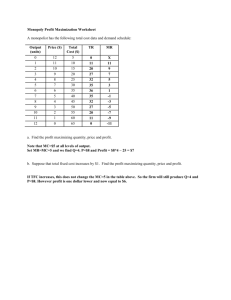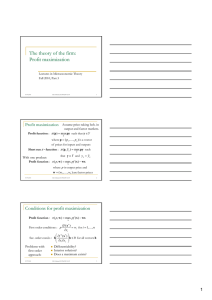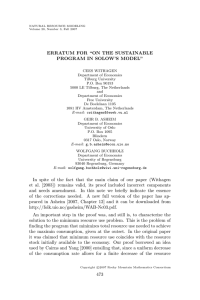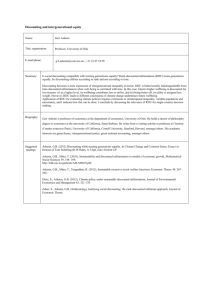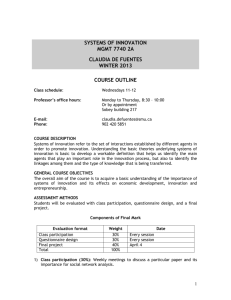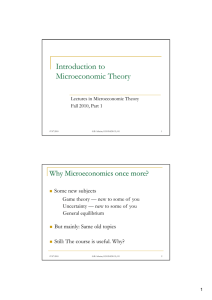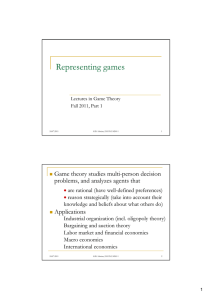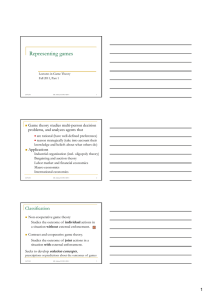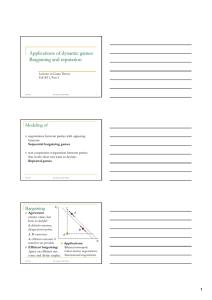The theory of the firm: Profit maximization Assume price-taking beh. in
advertisement
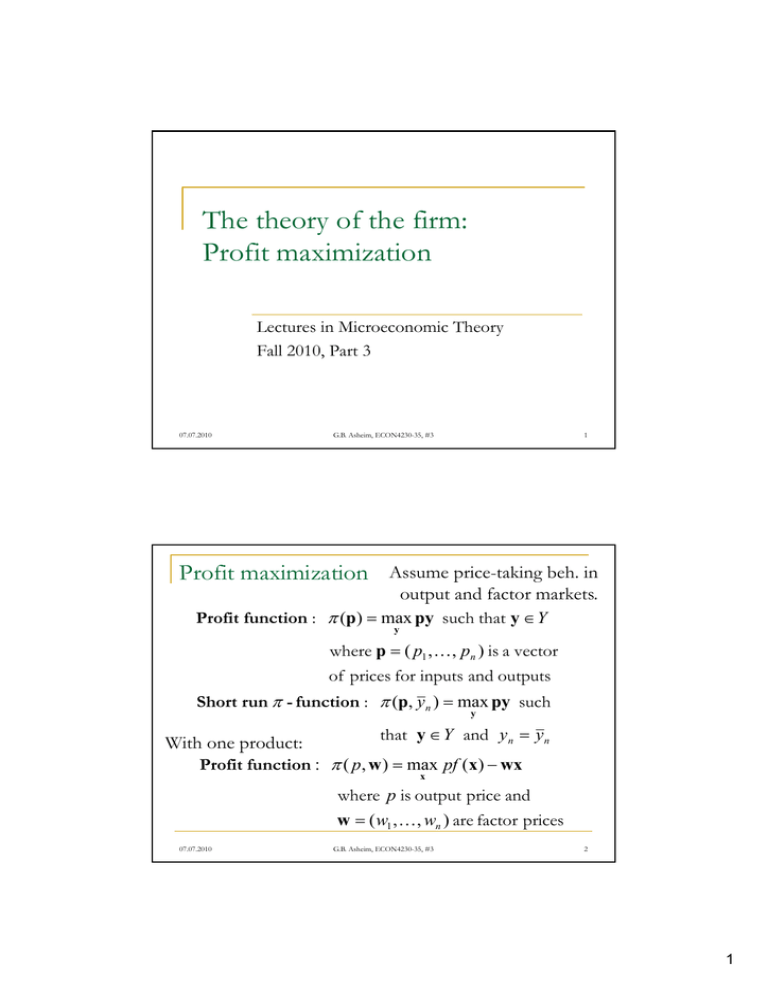
The theory of the firm: Profit maximization Lectures in Microeconomic Theory Fall 2010, Part 3 07.07.2010 G.B. Asheim, ECON4230-35, #3 Profit maximization 1 Assume price-taking beh. in output and factor markets. Profit function : (p) max py such that y Y y where p ( p1 , , pn ) is a vector of prices for inputs and outputs Short run - function : (p, yn ) max py such y With one product: that y Y and y n y n Profit function : ( p, w ) max pf ( x) wx x where p is output price and w ( w1 , , wn ) are factor prices 07.07.2010 G.B. Asheim, ECON4230-35, #3 2 1 Conditions for profit maximization Profit function : ( p, w ) max pf ( x) wx x f ( x ) First order conditions : p wi for i 1, , n xi f 2 ( x ) h 0 for all vector s h Sec. order cond.s : h x x i j Problems with first-order approach: 07.07.2010 Differentiability? Interior solution? Does a maximum exists? 3 G.B. Asheim, ECON4230-35, #3 No maximum; profit can be increased by increasingg scale y No interior solution y Y x y Y x Y 07.07.2010 Kink at maximum x G.B. Asheim, ECON4230-35, #3 4 2 Factor demand function y x( p, w ) arg max pf ( x) wx x Properties: (Comp. statics) xi (tp , tw ) xi ( p, w ) xi 0 for i 1, , n wi xi x j for i 1, , n w j wi x A Cobb-Douglas technology Production function : f ( x) x a Output supply function y ( p, w ) f ( x( p, w )) 07.07.2010 a0 First - order condition : pax a 1 w Sec. - order cond. : pa (a 1) x a 2 0 a 1 1 w a 1 Factor demand function : x ( p , w) a ap w a 1 Output supply function : y ( p, w) f x ( p, w) ap 1 - function : 1 a w a 1 py ( p , w) wx ( p, w) w a ap 5 G.B. Asheim, ECON4230-35, #3 What happens when the output price increases? py w x py w x y py w x py w x ( y , x) p y y w x x p y y w x x ( y , x) ( y , x) If w w , then p p y y 0 x p p implies y y 07.07.2010 G.B. Asheim, ECON4230-35, #3 Weak axiom of profit maximization 6 3 Profit function ( p, w ) max pf (x) wx x Properties: (No assumptions about the technology needed). (1) Non - decreasing in p , non - increasing in w. Profit function: Proof of property (1) Assume p p and wi wi for all inputs . Let ( y , x) be - maximizing at ( p , w ), so that ( p , w ) py wx Let ( y,x) be - maximizing at ( p, w ), so that ( p , w ) py w x By - maximization : ( p, w) py wx py wx Since p p and wi wi for all inputs p , py wx py wx ( p, w ) Hence : ( p, w) ( p, w) (2) Homogene ous of degree 1 in ( p, w ) : (tp, tw ) t ( p, w ) for all t 0. ( p, w ) Profit function: Proof of property (2) Let ( y , x) be - maximizing at ( p , w ) , so that ( p , w ) py wx However, if ( p, w ) py wx py wx, then tpy twx tpy twx Hence, ( y , x) is - maximizing at (tp , tw ). (3) Convex in ( p, w ) A Cobb-Douglas technology Production function : f ( x ) x a a0 First - order condition : pax a 1 w a 1 Sec. - order cond. : pa (a 1) x a 2 0 1 w a 1 Factor demand function : x( p , w) a ap w a 1 Output supply function : y ( p, w) f x( p, w) ap 1 - function : 1 a w a 1 py ( p, w) wx ( p , w) w a ap ( p, w ) Profit function: Proof of property (3) Let ( y , x) be - maximizingg at ( p, w ). Let ( y , x) be - maximizing at ( p, w ). Let ( y, x) be - maximizing at ( p , w) t ( p, w) (1 t )( p, w). By - maximizati on : t py w x t py wx t ( p, w ) (1 t ) py w x (1 t ) p y w x (1 t ) ( p, w ) ( p, w ) Adding these two inequalit ies together ( p, w) t ( p , w ) (1 t ) ( p , w) Slope : y ( p, w ) 07.07.2010 7 G.B. Asheim, ECON4230-35, #3 Hotelling’s Lemma ( p, w) ( p, w ) py ( p, w ) Proof of Hotelling’s Lemma Suppose y is a - maximizing output at ( p , w ). Define the function g ( p ) ( p , w ) py w x p p (4) Continuous in ( p, w ) wx ( p, w ) ( p, w ) ( p, w ) Slope : y ( p, w ) p g ( p) p p p Then g ( p ) ( p , w ) y 0 p Assume differentiability. ( p, w ) y ( p, w ) p ( p, w ) xi ( p, w ) wi 07.07.2010 Invoke convexity. A Cobb-Douglas technology Production function : f ( x ) x a a0 First - order condition : pax a 1 w Sec. - order cond. : pa(a 1) x a 2 0 a 1 1 w a 1 Factor demand function : x( p, w) a ap w a 1 Output supply function : y( p, w) f x( p, w) ap 1 - function : 1 a w a 1 py ( p , w) wx( p , w) w a ap y ( p, w ) 2 ( p, w ) 0 p p 2 xi ( p, w ) 2 ( p, w ) 0 wi wi2 G.B. Asheim, ECON4230-35, #3 8 4 More on Hotelling’s Lemma y ( p, w ) ( p, w ) p ( p, w) ( p, w) ( p, w) Slope : y ( p, w) p xi ( p, w ) ( p, w ) wi p Invoke Young’s theorem. x ( p, w ) y ( p, w ) 2 ( p, w ) 2 ( p, w ) i wi wi p pwi p x j ( p, w ) xi ( p, w ) 2 ( p, w ) 2 ( p, w ) wi w j w j wi wi w j 07.07.2010 G.B. Asheim, ECON4230-35, #3 9 The LeChatelier principle Long-run response greater than short-run response? Suppose one output and that all input prices are fixed. Short - run profit : S ( p, z ) where z is some input fixed in the short - run. Long - run profit : L ( p ) S ( p, z ( p )) Let p be some output price, and let z z ( p ) be the optimal long - run demand at p . h( p ) L ( p ) S ( p, z ) S ( p, z ( p )) S ( p, z ) 0 07.07.2010 G.B. Asheim, ECON4230-35, #3 10 5 h( p ) L ( p ) S ( p, z ) h( p ) 0 h( p ) 0 yL ( p ) h( p ) 0 p p By Hotelling’s Lemma: d L ( p ) S ( p , z ) yS ( p , z ) p dp By Hotelling’s Lemma: dy L ( p ) d 2 L ( p ) 2 S ( p , z ) y S ( p , z ) dp dp 2 p p 2 07.07.2010 G.B. Asheim, ECON4230-35, #3 11 Profit function: Proof of property (1) Assume p p and wi wi for all inputs . Let ( y , x) be - maximizing at ( p, w ), so that ( p, w ) py wx Let ( y , x) be - maximizing at ( p, w ), so that ( p, w ) py w x Byy - maximizati on : ( p, w ) py w x py w x Since p p and wi wi for all inputs , py w x Hence : ( p, w ) ( p, w ) 07.07.2010 py wx ( p, w ) G.B. Asheim, ECON4230-35, #3 12 6 Profit function: Proof of property (2) Let ( y , x) be - maximizing at ( p, w ), so that ( p, w ) py wx However, if ( p, w ) py wx py w x, then tpy twx tpy tw x Hence, ( y , x) is - maximizing at (tp, tw ). 07.07.2010 G.B. Asheim, ECON4230-35, #3 13 Profit function: Proof of property (3) Let ( y, x) be - maximizing at ( p, w ). Let ( y , x) be - maximizing at ( p, w ). Let ( y , x) be - maximizing at ( p, w ) t ( p, w ) (1 t )( p, w ). By - maximizati on : t py w x t py wx t ( p, w ) (1 t ) py w x (1 t ) py w x (1 t ) ( p, w ) Adding these two inequalit ies together ( p, w ) t ( p, w ) (1 t ) ( p, w ) 07.07.2010 G.B. Asheim, ECON4230-35, #3 14 7 Proof of Hotelling’s Lemma Suppose y is a - maximizing output at ( p , w ). Define the function g ( p ) ( p, w ) py w x g ( p) p Then g ( p ) 07.07.2010 p ( p , w ) y 0 p G.B. Asheim, ECON4230-35, #3 15 8
